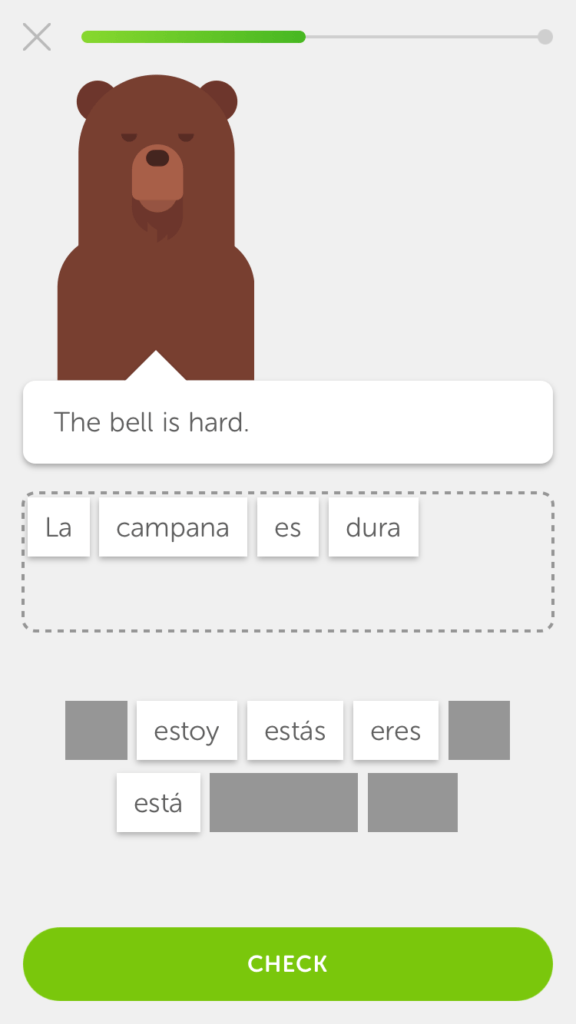This phallic reference on the left is not from the “flirting” bonus add-on that you buy with lingots on Duolingo. But it could have been. The “flirting” app did have “I want to try something sweet, can I taste your lips? / ¿Quiero probar algo dulce, podría saborear tus labios?” and it was worth the lingots or gems or whatever.
I have to thank my ex-coworker at The Echo, Vickki Acuna, who criticized my tattoos as being “mismatched”, but recommended me this cool language learning app called Duolingo. Duolingo teaches you a very basic list of words that are commonly used in the language of your choice. For every language, you begin at the first levels with very simple words and, in the case of Spanish, learn how to use subjunctive past. I played Duolingo every day for a year until I mastered all of the levels of Spanish back in 2017. Eventually, Duolingo introduced group speaking events. There was a friendly guy named Danny Sims who likes the Spanish language as second language but doesn’t do Duolingo himself that began hosting group events in Los Angeles. After trying to order drinks on the Duolingo tab, which was actually his tab, I learned he was just a language geek and does this stuff for free. I eventually learned Duolingo runs mostly everything on a volunteer basis.
My spouse and I (second to top left) attended the first ever Duolingo event at Casey’s Irish Pub in August 2017. At these events, you get to practice speaking the language, rather than listening to and filling in blanks of sentences delivered by cartoon people. It was a lot of fun, and I have gone to quite a few more “intercambios” since 2017. Most of the time, the people who come to the Duolingo events are at a very beginning conversational level like I was in 2017 before I moved to Spain. Now I am usually the more advanced speaker, not because of Duolingo events, but because I have taken Spanish 4, 5, a conversation course and an immersion course since then. And I am conversationally still like gelatin next to a native Spanish speaker.
After using Duolingo for a few years, it will prepare you well for Spanish 1 through 4 at an American college. Duolingo will not prepare you for using the language in casual conversations with native speakers, classes conducted in other languages, writing assignments, bureaucratic things like getting citizenship in another country, cursing at people, hooking up or understanding cinema and tv shows. This, you have to rely on actually practicing. When confronted with not understanding someone, I usually rely on the person’s body language conveying more than what I grasped at what they’ve said.
It is easy not to practice speaking or listening on the app since you can always disable it. I usually disabled speaking and listening on Duolingo because I practiced almost exclusively not at home. Over the years, I have practiced at a job, waiting in line, on the metro or otherwise waiting for something or someone. After you learn the basic verbs and context, it becomes very predictable and an almost lazy activity. So I stepped it up.
Learning Two Languages at Once on Duolingo
When I taught English at a private cooperative bilingual school in Madrid, I was inspired by a teacher named Juanan who taught his kids Chinese through English. He would show funny videos from a YouTube channel called ChineseBuddy. The songs would be sung in Chinese and have English subtitles. It was impressive how Spanish kids learned how to speak Chinese through a trilingual approach from English.
I felt inspired to learn another language as practicing on Duolingo became too easy, so I began learning Italian from Spanish for Spanish speakers on the app. Both languages use the same bank of words, which helped me remember common words in English that I wasn’t too familiar with.
Both Spanish and Italian are romance languages with sentence structures that are mostly the same. The difference is mostly in the treatment of articles and plural words. But! There are certain common words that you realize you didn’t know one language, that are really common in English and another language.
To become, for example, is the simple diventare in Italian but there is no simple way to easily become something in Spanish. Convertirse en, ugh…
You have one word in English:
I become a man.
You have one word in Italian (hai una parola in italiano):
Io divento un uomo.
But, you have three words in Spanish (tienes tres palabras en español):
Yo me convierto en un hombre.
You have to do the reflexive romantic word, plus add to.
The direct translation to English is like saying I get converted to a man.
So, doing the trilingual approach makes me learn words that I didn’t realize I didn’t know and then it helps strengthen everything else.
The New Duolingo: Error-Shaming You to Use Premium!
The green Duolingo owl has become quite the Starbucks siren. Ever since a Duolingo update in December 2019, Duolingo has radically changed the way in which the game is played. You are very limited to taking on new levels now. You don’t have unlimited play anymore. You have ‘hearts’ to lose and ‘gems’ to earn. You will not be able to test out of levels without paying in ‘gems’. You will be restricted game play to levels that you already completed if you lose all of your ‘hearts’.
So, in the meantime, some people are switching over to the Duolingo website now since it doesn’t have ‘hearts’ and ‘gems’ to lose. The duolingo.com/learn website still lives in the past with ‘lingots’. Considering that the app is volunteer-run and people are actively improving the app without being compensated, where is all the money for buying premium membership going?
These Duolingo feedback emails used to list the volunteers like “SaraGalesa” and “sanio” who helped add and correct errors to the translation bank. Eventually sometime after 2017, Duolingo made these countless number of volunteers anonymous to the public.
Money is being made from Duolingo incentivizing people into buying premium memberships by error-shaming and restricting them from learning. Some of these tireless unpaid volunteers like “SaraGalesa” and “sanio” who help approved a few of my many translation suggestions on Spanish Duolingo over the years should be getting paid and not in lingots (or gems).
So if anyone should be getting that Premium Membership money being raked in, please give it to the many volunteers who have vastly improved the translations on Duolingo and then the global ambassadors like Danny Sims from Los Angeles who have been bringing us together.








